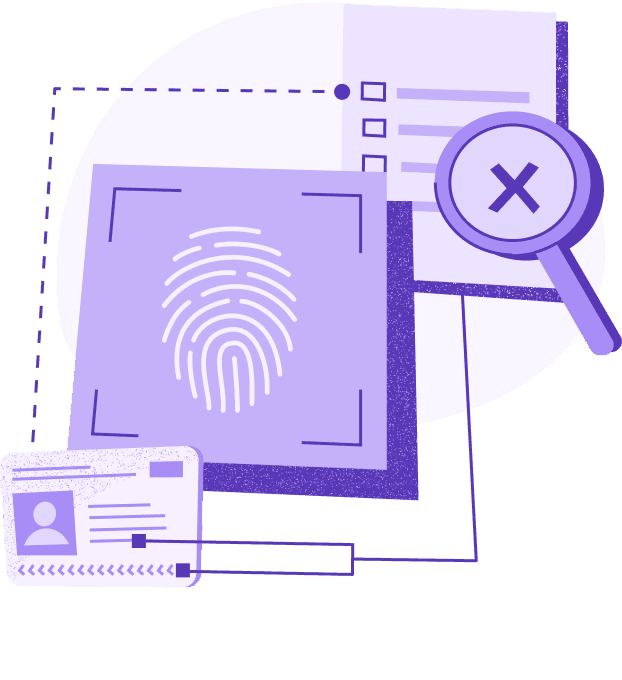Article
5 min read
A Guide to Employee Background Checks in Canada
Employee background checks

Author
Michał Kowalewski
Last Update
April 14, 2025

Table of Contents
What employers need to know before running background checks in Canada
Penalties for violating privacy laws in Canada
Are background checks legal in Canada?
What types of background checks are illegal in Canada?
Common background check industries in Canada
Types of employee background checks in Canada
Background check mistakes to avoid in Canada
Step-by-step guide of employee background checks in Canada
Run employee background checks with Deel
Key takeaways
- Employee background checks in Canada must comply with federal and provincial privacy laws, including the Privacy Act and PIPEDA
- Employers should avoid common mistakes such as failing to obtain informed consent, engaging in discriminatory practices, misusing background check information, and neglecting privacy laws
- Common background checks in Canada include criminal record checks, employment history verification, qualification verification, and professional license verification
Employee background checks should be an integral part of your hiring process in Canada. Although not mandatory, they are a common practice, especially in healthcare, finance, education, government, law enforcement, child and elder care.
Canada is known for its diverse and skilled workforce, with approximately 1.5 million workers in the tech sector as of 2023. The tech workforce is expected to continue growing, emphasizing the need for thorough background checks to ensure hiring top-tier professionals. The country offers a compelling mix of innovation and high-quality output, with minimal cultural barriers and excellent communication skills due to high English and French proficiency.
When hiring in Canada, it's crucial to be mindful of local employment laws, particularly regarding background checks. This highlights the importance of a thorough understanding of local practices to ensure a smooth and compliant recruitment process.
In this article, you’ll learn:
- How to run an effective and legal employment screening in Canada
- What are the common types of employee checks in Canada
- Step-by-step process of a thorough employee screening
- What mistakes to avoid when performing a background check in Canada
What employers need to know before running background checks in Canada
An employee background check is the process of verifying a potential hire’s work history, education, professional qualifications, and any criminal records they might have. It’s particularly beneficial to run before finalizing an employment offer or signing a contract, ensuring the candidate meets the company's standards and requirements.
In Canada, employee background checks are governed by the [Privacy Act and PIPEDA](https://www.priv.gc.ca/en/privacy-topics/privacy-laws-in-canada/the-personal-information-protection-and-electronic-documents-act-pipeda/pipeda_brief/#:~:text=The Personal Information Protection and,profit, commercial activities across Canada.), and enforced by the Office of the Privacy Commissioner of Canada (OPC).
- Privacy Act: This federal law regulates the collection, dissemination, and use of personal information by federal government institutions.
- PIPEDA: This law applies to private sector organizations and mandates how personal information is collected, used, and disclosed in the course of commercial activities. It requires employers to obtain explicit consent from individuals before conducting a background check and to provide them with specific disclosures and notices. It emphasizes the need for accuracy, relevance, and transparency in data processing.
The OPC oversees compliance with PIPEDA and provides guidance on how organizations can conduct background checks while respecting individuals' privacy rights. Employers should also be mindful of provincial privacy laws, as some provinces have additional regulations governing the handling of personal information.
Penalties for violating privacy laws in Canada
In Canada, the consequences of violating privacy laws during employee background checks can be severe, with significant penalties and fines imposed on organizations. Various federal and provincial privacy laws regulate the collection, use, and disclosure of personal information, ensuring that individuals' privacy rights are protected. Here are some key details regarding the fines and penalties associated with these violations:
Under the Personal Information Protection and Electronic Documents Act (PIPEDA), organizations can be fined up to CAD 100,000 per violation. This law, enforced by the Office of the Privacy Commissioner of Canada (OPC), mandates explicit consent from individuals before conducting background checks and requires that the collected information is used strictly for employment decision-making. Failure to comply with PIPEDA can result in substantial financial penalties and legal repercussions.
Provincial privacy laws also impose strict penalties. For instance:
- Alberta’s Personal Information Protection Act (PIPA) and British Columbia’s PIPA both allow for fines up to CAD 100,000 per violation.
- In Quebec, the privacy act permits fines up to CAD 25,000,000 or 5% of global revenue, whichever is greater. These laws emphasize the importance of obtaining explicit consent and ensuring the proper handling of personal information.
A notable recent example of a company being fined for violating privacy laws in Canada is the case involving Tim Hortons. In 2022, the Office of the Privacy Commissioner of Canada (OPC) found that the Tim Hortons app violated privacy laws by collecting vast amounts of sensitive location data from users without their proper consent. This case highlights the strict enforcement of privacy regulations and the significant consequences for companies that fail to comply with these laws.
Are background checks legal in Canada?
Yes, background checks are legal in Canada, but they must be conducted in compliance with privacy laws and the principles of necessity and proportionality. Employers are required to obtain written consent from the candidate before initiating a background check and must provide a copy of the report if the information in the report leads to an adverse employment decision.
Specific regulations and restrictions that recruiters need to be aware of include the prohibition of using arrest records that did not result in conviction as the sole basis for employment decisions, as it may disproportionately impact certain groups protected under the Human Rights Act. Additionally, employers must avoid using protected characteristics (such as race, gender, and religion) in hiring decisions.
What types of background checks are illegal in Canada?
In Canada, certain types of background checks are considered illegal or highly restricted. For example:
- Credit checks: Conducting a background check on a candidate's credit history without explicit consent is prohibited, except in specific circumstances where the role requires financial trust or involves handling sensitive financial information.
- Genetic information: Employers are generally not permitted to inquire about a candidate's genetic information, as this falls under the protection of human rights legislation. Questions related to an individual's genetic predispositions or family medical history are off-limits during the hiring process.
- Arrest records: Using arrest records that did not result in conviction as the sole basis for employment decisions is generally restricted, as it may disproportionately impact certain protected groups.
- Medical information: Under the Personal Information Protection and Electronic Documents Act (PIPEDA) and provincial privacy laws, employers cannot request or use medical information for hiring decisions without explicit consent, and it must be relevant to the job.
- Protected characteristics: Employers must avoid background checks that use information on protected characteristics such as race, gender, religion, sexual orientation, or age, as these are prohibited under human rights laws.
Employers must ensure that their background check practices comply with both federal and provincial laws to avoid legal consequences and ensure fair and non-discriminatory hiring practices.
Background checks
Common background check industries in Canada
In Canada, certain industries rely heavily on background checks to ensure the integrity and safety of their workforce. These industries include:
- Healthcare: Given the sensitive nature of healthcare roles and the need to protect patient well-being, healthcare organizations often conduct thorough background checks, including criminal record checks and verification of professional qualifications.
- Financial services: Positions within the financial services sector, such as banking and investment firms, often require stringent background checks, including credit history checks, to assess an individual's financial trustworthiness.
- Education: Educational institutions conduct background checks to verify the credentials and suitability of candidates applying for teaching and administrative positions, especially those involving contact with students.
- Government and law enforcement: Positions within government agencies and law enforcement organizations require comprehensive background checks, including criminal record checks and security clearances, to ensure the integrity of public service roles.
- Child and elder care: Organizations providing care for children and seniors prioritize background checks to screen potential employees for any history of abuse, criminal activity, or other concerning behaviors.
Types of employee background checks in Canada
Effective employment screening in Canada covers essential aspects to evaluate a candidate's abilities. Knowing these areas helps employers tailor screening processes to meet job requirements and legal standards.
| Type of Check | Common in Canada | Reason |
|---|---|---|
| Criminal record check | Common | This is a standard check conducted by employers to assess a candidate's criminal history and ensure the safety of the workplace |
| Employment history verification | Common | Important for confirming a candidate's work history, helping to prevent resume fraud and ensure they have relevant experience |
| Qualification verification | Common | Ensures that the educational and certification claims made by a candidate are legitimate and meet job requirements |
| Professional license verification | Common | For regulated professions, employers commonly verify a candidate's professional licenses to ensure compliance with industry standards |
| Credit history check | Less common | Particularly relevant for roles in finance, banking, and other positions of trust, helping employers gauge financial responsibility |
| Social media screening | Increasingly common | Growing in popularity as employers seek to understand more about a candidate's character and potential cultural fit within the company |
Background check mistakes to avoid in Canada
Whether you’re hiring employees or contractors in Canada, there are a few things you shouldn’t do as an employer when it comes to background checks:
- Failing to obtain informed consent: Conducting background checks without obtaining explicit consent from the candidate can lead to legal repercussions and privacy violations.
- Discriminatory practices: Employers must ensure that background checks are conducted uniformly for all candidates and do not discriminate based on protected characteristics, such as race, gender, or disability.
- Misuse of information: Using background check information for purposes other than making employment decisions, or unlawfully disclosing it to third parties, can result in legal consequences.
- Inadequate document retention and disposal: Failing to establish secure protocols for retaining and disposing of background check information can lead to unauthorized access or privacy breaches.
- Neglecting privacy laws: Disregarding the requirements of the Privacy Act and PIPEDA can result in penalties and damage to the organization's reputation.
Step-by-step guide of employee background checks in Canada
Employers looking to hire in Canada should follow the list of steps below to ensure legal and effective and thorough employee background checks.
-
Obtain informed consent: Before initiating any background checks, obtain the candidate's explicit consent in writing, outlining the specific types of checks that will be conducted and how the information will be used.
-
Verify work experience and education: Contact previous employers and educational institutions to verify the candidate's work experience and educational qualifications. This step helps ensure that the candidate's stated credentials are accurate.
-
Criminal record check: Depending on the nature of the role, employers may conduct a criminal record check through the Royal Canadian Mounted Police (RCMP) or local police services. This is particularly important for positions that involve working with vulnerable populations or handling sensitive information.
-
Reference checks: Contact the candidate's provided references to gather insights into the candidate's work ethic, performance, and interpersonal skills. This step provides valuable perspectives from individuals who have worked closely with the candidate in the past.
-
Professional qualifications: For roles that require specific professional certifications or licenses, verify the candidate's qualifications with the relevant professional associations or regulatory bodies.
-
Social media screening: While not mandatory, some employers choose to conduct a basic review of a candidate's public social media profiles to gain additional insights into their character and conduct.
-
Credit checks (if applicable): If the role requires handling financial responsibilities, employers may conduct a credit check with the candidate's consent. However, this should be limited to positions where financial trust is a critical requirement.
-
Compliance with privacy laws: Throughout the background check process, ensure strict compliance with the Privacy Act and PIPEDA, safeguarding the confidentiality and security of the candidate's personal information.
-
Document retention and disposal: Establish secure protocols for retaining and disposing of background check information in accordance with privacy laws to prevent unauthorized access or disclosure.
-
Decision making: Use the verified information from background checks to inform hiring decisions, ensuring that they are based on accurate and relevant data.
You can also automate this process using Deel, and get a fast employee background check, with results coming in a matter of minutes.
After exploring various providers, it's clear that Deel is the best on the market. We were able to hire approximately 40 employees in the Philippines within a matter of months. Their background check process was easy and effective and made us feel safe about hiring in new markets. We're truly grateful for the opportunity to work with this team!
—Bree Cohen,
Vice President of Talent at Power Digital Marketing
Run employee background checks with Deel
There’s no need for HR to log into yet another platform or manually chase documents. With screenings in over 200 countries and territories (and counting), you can manage background checks for global employees and contractors with a single source of truth without leaving the Deel platform.
Start running fast background checks with Deel—request a demo today.

About the author
Michał Kowalewski a writer and content manager with 7+ years of experience in digital marketing. He spent most of his professional career working in startups and tech industry. He's a big proponent of remote work considering it not just a professional preference but a lifestyle that enhances productivity and fosters a flexible work environment. He enjoys tackling topics of venture capital, equity, and startup finance.
















